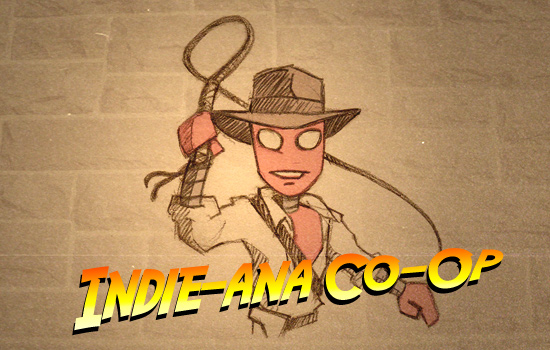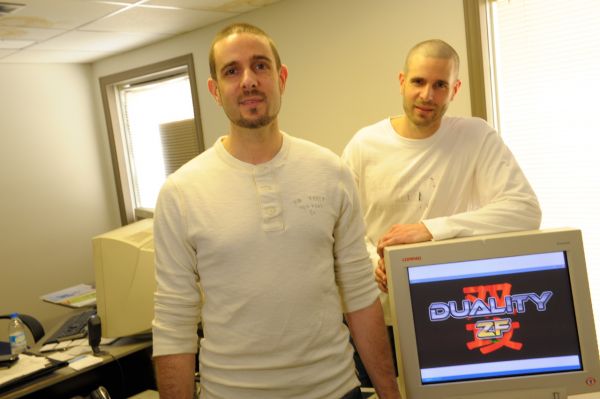

Co-Optimus: Tell us a little about yourself and your studio, Xona Games. How did you get started in games development? Where’d the name come from? What’s your background in games development?
Matthew: Jason and I have been making games since we were seven years old, in grade 2, and were programming a year or two before that. We’ve always been into programming, computer graphics, and games. [Ed. Note: Past projects can be found at jasondoucette.com and matthewdoucette.com.] Jason has a lot of past work on his page, all of it interesting, including world records. It gives a hint of where we came from. We also have a tribute page on our first computer, the TI-99/4A here.
Xona Games was originally Saw Tooth Distortion, a name Jason came up with that all our software (freeware) products were labeled with. It eventually became our demo group name as well. Once the Internet age hit, it was too long for a dot-com, so I spent 3 full days researching new names. The name I came up with was Xonatech. The “Xona-“ prefix was the next proposed extension to the SI prefixes (kilo-, mega-, giga-, etc.). Two weeks later we were able to purchase xona.com from the inventor of the Rambo knife, Peter Klika. Small world! This new dot-com made “Xona” a great prefix for any projects we would work on, not to mention an awesome four-letter dot-com. Apparently they are all taken now. Once we got into gaming, “Xona.com” became “Xona Games”.
Co-Optimus: Your first game on XBLIG was Decimation X, a co-op shooter very reminiscent of Space Invaders, and you say on your website that you all “concentrate on nostalgic game concepts with modern-day gameplay and intensity.” Why that particular area of gaming?
Matthew: We make games that we miss. Simple as that. If there’s a game we want to play that nobody has made, or nobody has made properly, then we view that as an opportunity. Plus, there’s reason to suggest you cannot succeed making games you do not want to play yourself. And I am assuming the nostalgic feel to our games comes from our early game development and our inability to officially develop and release games from our early childhood. It’s just a guess, but somehow I think we are fulfilling now what we couldn’t do before. In a sense, we are making the games we’ve always wanted to make, but couldn’t.
The brothers Doucette - Jason on the left and Matthew on the right - showing off their upcoming XBLA release, Duality ZF
Co-Optimus: Is that same nostalgic concept the reason why your games have co-op? What sparked the decision to include co-op instead of just saying “we’ve got a game a gamer can play, let’s just put this out there?”
Matthew: Yes. In the world of 3D there is no such thing as same-screen same-room gaming. We are bringing it back. I loved playing two player Super-C (Contra’s sequel). If we could reproduce those experiences, then that is success. In a pitch video for Duality ZF I noted, “We rekindle past experiences, not past games.” It’s an important distinction. Our expectations as gamers have changed over time, so it’s difficult to deliver those same emotions we once had. The “awe” of new graphics and audio is all but gone, so we accomplish it with challenging experiences with nostalgic graphics and art.
A screen from Decimation X3, an improved version of their original Decimation X XBLIG release
Co-Optimus: Have there been any particular challenges you’ve noticed in developing co-op games?
Matthew: Co-op games require more beta-testing, and beta-testing doesn’t come easy. We’ve all played games and asked if the development team even bothered to beta-test it. Obviously the answer is yes, but beta-testing is a deep commitment, too deep to ask friends and relatives to complete and too expensive for indie studios to hire out.
Co-Optimus: When implementing co-op play, were there certain features you considered trying out, like co-op based attacks? Or did you want to just keep things straightforward and simple?
Matthew: We thought of all of these things. We have been told so many times that Duality ZF, our upcoming 4-player shmup, should have ships that merge together. Aegis Wing and other shmups allow merging of multiple players’ fighters, but in the end it’s kind of lame. So, instead of doing something that only sounds cool, we do things that are cool in implementation and stay away from marketing gimmicks. An example feature in Duality ZF that works is the ability for each player to control two fighters at once, something we coined as “dual play”. Dual play is an underground concept created in Japanese arcades, where a master player would put quarters into both slots and control player 1 and player 2 at the same time, usually with buttons taped down. Point is, they wouldn’t do it if it didn’t work. So it works. So we use it.
So to answer your question directly, we do keep things simple only because it works. We really concentrate on what works first and try to make it simple after. Most innovative game concepts are complicated, which lowers their general reception. It often makes for a hard circle to square. I still have complete respect for Ikaruga’s polarity feature, as well as the integration of it across three difficulty modes in different fashions. It’s awesome, simple, works, and I wish I came up with it.
Screen from Score Rush, the first widescreen bullet hell 'shmup; there are 4 players somewhere in there, we swear
Co-Optimus: The games you’ve produced thus far have gone from Space Invaders, with various improvements and tweaks along the way, to the twin-stick shooter. Why shooters/this particular genre?
Matthew: Decimation X, the Space Invaders game, is actually based off TI-Invaders, which we both think is the best Space Invaders clone ever made, better than the original. Jason coded [Decimation X] in a day, from scratch, during a boring day at work in a summer job. (Why we didn’t just stay home and make games still frustrates me. Tip from Xona Games: Follow your heart!) When we ended up in the top 3 in a $100,000 start-up technology contest, and realizing our competition hadn’t gone to market yet, we knew we would win if we could showcase our ability to get to market. So over the next 3.5 weeks, Jason coded Decimation X precisely for this purpose, because it was a fast game to make. On some level we are upset with its quality, which is lower than anything we will ever produce again, but when it became #1 in Japan in ratings during the 2-week judging section winning us the contest, it helped us accept it.
Decimation X was released for business reasons not hobbyist reasons. There’s the distinction between hobbyist and business that you will run into over and over again while starting up your own game studio. These are the toughest decisions to make… And as you grow as a company you start to realize complaints from gamers and press can all too often be unrealistic in their expectations. You have to survive, to continue to make games, while trying to sell out the least possible. One example company comes to mind: Treasure. Think of the games they are most respected for (Ikaruga, Radiant Silvergun, Gunstar Heroes) and look up the games that have made them the most money. You’ll be surprised.
Next Score Rush, which is the worlds’ first widescreen bullet hell shmup. It was an experimentation of Duality ZF concepts, and uses the Duality ZF engine as well as early Duality ZF enemy prototypes. (We actual detail some of the lessons learned from this experiment here.) The problem with bullet hell games going widescreen is you move too slow to cover the screen. The solution? Multidirection shooting. It was born out of necessity. Plus it made Score Rush the worlds’ first bullet hell dual-stick shmup!
So, there it is. Both came from necessity. Our real goal is found in Duality ZF, a 2D shooter that we’ve always wish was made for us to play but never was.
A preview of what's to come with their upcoming XBLA/PSN/Steam release: Duality ZF
Co-Optimus: Are there other game-types/genres you’re interested in exploring? If so, why that particular genre and would you continue to include co-op?
Matthew: Yes, arcade style racing games and beat ‘em ups. Jason coded an OutRun style engine in grade 8, and we’ve been itching to use that technology every since. We know and love arcade racers as much as we do shmups, so I think it’s a niche market we can also dominate. Plus Jason’s optimization skills are fantastic, so we could get crazy performance out of such a retro engine that’s never been seen before. Off topic but it also shows why we make our own engines. You can’t do a game (as good) in a prefab engine.
As for beat ‘em ups, same idea. We love Streets of Rage, didn’t like Double Dragon, and we think there’s some subtleties there we can address and make a great fighter game. We will always have co-op, although the racing game might not if we choose to not split-screen. Split screen co-op isn’t as powerful as same-screen co-op.
Co-Optimus: What’s one of your favorite “nostalgic” co-op moment?
Matthew: The best co-op moment was Jason and I playing Super-C; one of us with spread and the other with fire. Note that a single spread can create 10 on-screen bullets but two spreads can only total 16! And also note the fire can power up if you hold the button. We decimated bosses. Particularly the boss on stage 6 was killed in less than a second. I remember we (jokingly) commented on how the developer never intended for such domination! When we kicked ass we would always call it “decimation”, that’s where the name “Decimation X” comes from, “X” being a unique identifier.
At some point, the decision must be made to make games for fun, or for business. Which is serious.
Co-Optimus: What would you say is the biggest challenge you’ve faced in being an “indie” games developer?
Matthew: By far the biggest challenge is the transformation from a hobbyist to a business. It comes down to different disciplines and different decisions - very hard decisions that can feel wrong to your core. It still plagues us and I would be lying if I said otherwise.
Co-Optimus: In your opinion, what’s your view on the “state” of co-operative gameplay in the games industry? Has it gotten better since the days of coin co-op arcade machines? Do you think that it’s become a “bullet point on the back of the box?”
Matthew: It’s an after thought, just like leaderboards are in most XBLA games. It’s too bad. We just happen to make games that are great co-op. Who doesn’t want to play an amped up Space Invaders like game with four players? It’s just fun.
Co-Optimus: What’s next for Xona Games?
Matthew: Duality ZF on XBLA, PSN, and Steam. Can it be done? We hope so. Beyond that, world domination!
We'd like to thank Matthew for his time and look forward to Xona Games' next co-op title! Remember, if you're an indie developer that makes co-op games and would like Co-Optimus to feature your game in an Indie-Ana Co-Op feature, send an e-mail to indie@co-optimus.com!